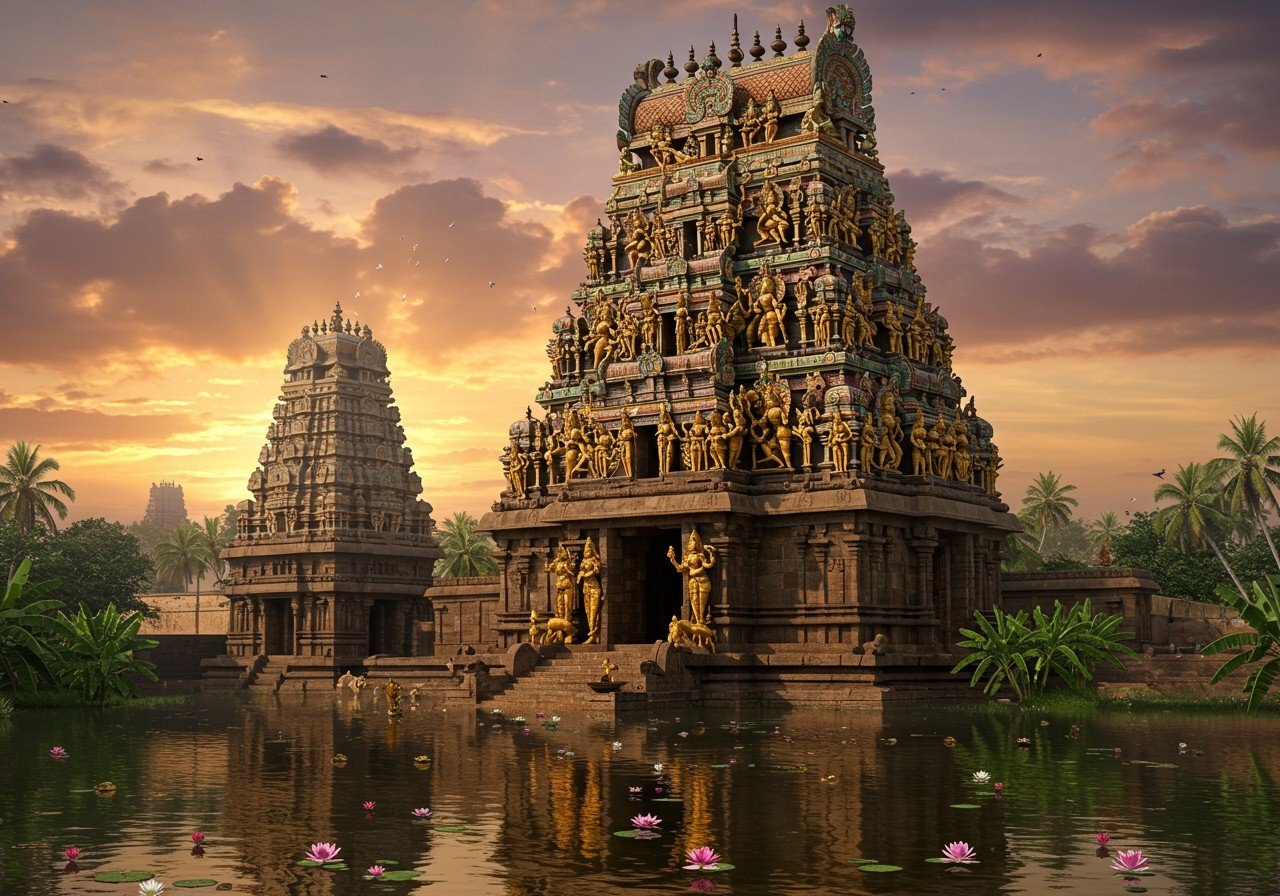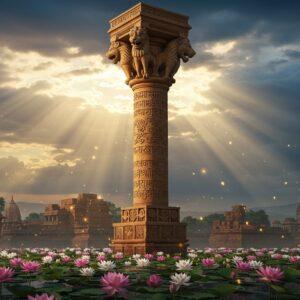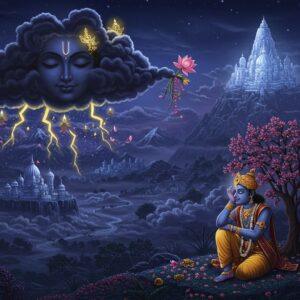
Nestled in the heart of Thirupper Nagar, Tamil Nadu, the Appakkudathaan Perumal Temple stands as a testament to the rich tapestry of South Indian temple architecture and spiritual heritage. This sacred site, believed to have been built during the glorious Chola dynasty, invites you to embark on a journey through time, immersing yourself in centuries-old traditions and architectural splendor.
A Glimpse into the Temple’s History and Significance
The Appakkudathaan Perumal Temple holds a special place among the 108 Divya Desams, the sacred abodes revered by devotees of Lord Vishnu. Legend has it that Lord Vishnu manifested here as Appakkudathaan, the deity who graciously accepted offerings presented in a simple, humble pot. This narrative resonates deeply with devotees, who visit the temple seeking a connection to these ancient stories and the divine presence they embody. The temple’s historical significance is further underscored by its mention in ancient texts, highlighting its enduring role in nurturing spiritual practices throughout the ages.
An Architectural Marvel: Exploring the Dravidian Style
The temple’s architecture is a breathtaking example of the Dravidian style, a hallmark of South Indian temple design. Intricate carvings and sculptures adorn the temple walls, showcasing the exceptional artistry of ancient craftsmen. Towering gopurams (gateway towers) and ornately designed pillared halls welcome you into a sacred space where art and devotion intertwine seamlessly. The temple’s layout encompasses the sanctum sanctorum, the heart of the temple, and various mandapams (halls) used for rituals and gatherings, each element imbued with deep spiritual meaning.
Would you like to bring a touch of this sacred architecture into your home? Poojn.in offers a beautiful selection of murtis, allowing you to create a personal space for prayer and reflection. You can also find traditional brass and copper items for puja, enhancing your connection to these sacred practices.
The Essence of South Indian Temple Architecture
South Indian temple architecture, also known as the Dravida style, flourished between the 7th and 18th centuries. Its distinctive features include the pyramidal tower (vimana), a majestic structure that rises above the sanctuary; the square-chambered sanctuary (garbhagriha), the dwelling place of the primary deity; and the pillared hall (mandapa), a space for gatherings and ceremonies. Temples are typically enclosed within a rectangular court, often featuring large water tanks and ornate gateway towers (gopurams) that mark the entrance to this sacred precinct.
- Pyramidal Tower (Vimana): The vimana is a defining characteristic of the Dravida style, its gradually receding stories creating a pyramidal shape, each story adorned with a parapet of miniature shrines. This intricate design symbolizes the ascent to the divine.
- Sanctuary (Garbhagriha): The garbhagriha, the innermost chamber of the temple, houses the temple’s primary deity (murti). This sacred space is considered the heart of the temple, a place of profound spiritual energy.
The Chola Dynasty’s Influence and Regional Variations
The Chola dynasty played a pivotal role in refining the Dravida style, constructing magnificent stone temples that stand as testaments to their architectural prowess. The Brihadeeswara Temple at Thanjavur is a prime example of Chola architecture, showcasing the grandeur and intricacy of this style. Temples like Appakkudathaan Perumal Temple, with their unique features and narratives, represent the rich diversity within the Dravida tradition. Regional variations in South Indian temple architecture further enhance the tapestry of this architectural style.
- Tamil Nadu: The Dravida style is prevalent in Tamil Nadu, as seen in iconic temples like the Shore Temple at Mahabalipuram and the Meenakshi Temple in Madurai.
- Karnataka: Variant forms of the Dravida style emerged in Karnataka, including contributions from the Chalukyas of Badami and the Western Chalukyas, leading to the development of the Vesara style, a harmonious blend of northern and southern architectural elements.
Temple Rituals: A Gateway to Spiritual Connection
At Appakkudathaan Perumal Temple, rituals hold deep spiritual significance, connecting devotees to the divine. The daily worship includes the unique tradition of offering appam (rice cake) to the deity. Annual festivals, such as Vaikunta Ekadasi, are celebrated with great fervor, bringing the community together in a vibrant expression of faith and devotion. These rituals offer a pathway to spiritual reflection and renewal, strengthening the bond between devotees and the divine.
Preparing for your temple visit? Poojn.in offers a range of traditional items, from pure cotton vastrams and dhotis to puja thalis and authentic South Indian garlands, to help you participate fully in these sacred practices.
Embracing the Legacy: A Timeless Invitation
The Appakkudathaan Perumal Temple is more than just a place of worship; it is a living testament to the enduring power of South Indian culture and spirituality. Visiting this sacred site is an opportunity to connect with the echoes of ancient chants, the artistry of dedicated craftsmen, and the profound sense of devotion that has permeated these walls for centuries. Whether you seek spiritual solace or cultural enrichment, the Appakkudathaan Perumal Temple welcomes you to embrace its timeless grace and embark on a journey of self-discovery.
Exploring South Indian Temple Architecture: FAQs
What distinguishes South Indian temple architecture? South Indian temple architecture, known as the Dravida style, features towering pyramidal structures (vimanas), intricate carvings, and expansive enclosures. It flourished between the 7th and 18th centuries, showcasing the architectural brilliance of various dynasties, especially the Cholas.
What are the key elements of a typical South Indian temple? A typical South Indian temple comprises the garbhagriha (sanctuary), the vimana (tower above the sanctuary), mandapas (pillared halls), gopurams (gateway towers), and often a temple tank. Each element plays a specific role in the temple’s function and symbolism.
Need puja essentials for your home or upcoming temple visit? Visit poojn.in today or connect with us via call at 03369029784 or WhatsApp at 9476142738. We offer a wide variety of high-quality products to enhance your spiritual practices.


